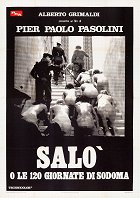Rendező:
Pier Paolo PasoliniOperatőr:
Tonino Delli ColliSzereplők:
Paolo Bonacelli, Giorgio Cataldi, Umberto Paolo Quintavalle, Aldo Valletti, Antiniska Nemour, Marco Bellocchio, Ines Pellegrini, Caterina Boratto (több)Tartalmak(1)
Az utolsó Pasolini-film De Sade márki nyomán: négy fasiszta egy villában a legváltozatosabb szexuális kínzásoknak veti alá a foglyokat. "A Saloval mindazokhoz fordulok, akik hozzám hasonlóan gyűlölik a Hatalmat, azért, amit az emberi testtel művel: dologgá aljasítja, s ezáltal az embert megfosztja a személyiségétől... Én különös hévvel gyűlölöm azt a hatalmat, amelytől most, 1975-ben szenvedek. Ez a hatalom olyan rettenetes eszközökkel manipulálja a testet, hogy még Hitlertől sincs mit irigyelnie:...új, elidegenített és hazug értékrendet hirdet, a fogyasztó társadalom értékeit. Ma az megy végbe éppen, amit Marx az élő, valódi, korábbi kultúrák megsemmisítésének nevezett..." (Pasolini) (Budapest Film)
(több)Recenziók (4)
Amikor 17 éves voltam, és úgy éreztem magam, mint egy "szellemes liberális értelmiségi", a Salo, avagy Sodoma 120 napja című film tetszett nekem. És bár ma sem vitathatom a film utolsó öt percében tapasztalható rendezői találékonyságot (voyeurista távcső és háttérben a repülőgépek fenyegető zúgása), a film többi része számomra csak egy öncélú homoszexuális (szex)exhibíció, minimális üzenetértékű mondanivalóval.
()
In its time, it was possibly the most controversial film, and that is saying something because it was the 1970s, full of wild antics and echoes of the sexual revolution, with the invasion of pornography into the public space. Fierce debates between guardians of morality, for whom Salo was the devil, and those who considered the same film to be the pinnacle of tormenting art to which contemporary critics simply did not measure up, filled all media outlets, and censorship even got involved. With the passage of time, Pasolini's final film no longer impresses me as something worth arguing about, nor is it a shock or surprise. Pigsty already convinced me that if Pasolini's final films deserve any attribute, it is unfortunately the word "boring." From my perspective, 120 Days of Sodom can be considered a perfect artistic failure. Just compare it to Klimov's masterpiece Come and See, where the filmmaker does not shy away from brutal shots, but they fit organically into the narrative, only make up a small part of the runtime, are never gratuitous, and yet have a devastating emotional impact. Klimov often only hints at things and works with the viewer's imagination and expectations. Pasolini is embarrassingly literal, static, and unoriginal. Furthermore, someone with a complicated and, dare I say, distorted sexuality should not have worked on this similar subject. It is practically impossible not to notice how often the camera satisfies Pasolini's homosexual desires and fantasies. Such a sensitive and demanding theme would have to be handled by someone bold, yet artistically exceptionally talented. I can think of Haneke or Lars von Trier, for example. The majority of Salo is filled with tedious, boring, and irrelevant stories of young women or pseudo-intellectual ramblings of the four owners of the human circus. Pasolini couldn't secure the presence of quality actors, which is especially evident in the fascist bosses who seem to have come out of some slightly artistically disguising soft porn, and their sliminess borders on caricature, sometimes even crosses it. Only in the last five minutes, when unusually brutal scenes of violence occur even for a jaded viewer, is Pasolini able to grab one's attention, but unfortunately in a manner that is far too cheap. Overall impression: 10% for the theme.
()
A film as morally complex as the provocative figure of its creator. It can easily be dismissed as cheap controversy and the portrayal of social taboos, but it’s harder to accept it as an undisguised satire that ridicules far more often than it shocks gratuitously. It’s not easy to watch, and Pasolini clearly aims at the lowest human instincts, but he does it with unquestionable awareness, constantly undermining the initial interpretations – in their exercise of absolute power, four assholes transform their prisoners into animals. The premise, straddling the border between Renaissance (Dante’s concept of hell, the architecture of the villa) and the modern threats of Fascism and consumerism, also turns those powerful people themselves into animals that are never satisfied and act ridiculously towards each other, while the mostly anonymous victims are obedient consumables and the threatened future of humanity. This also relates to the fact that Saló is not psychological at all, we can keep our distance from all the characters and the final stage of reconciliation makes clear to the viewer that they are unknowingly engaging in voyeurism and, maybe unconsciously, getting pleasure from the shocking and symbolic scenes. It’s a perfect “puppet” film where everything is built for the benefit of the message itself, which should never be taken too seriously. But I don’t think I would like to watch it again, the format becomes too mechanic at times, but from the perspective of the pressure on the viewer and the opinionated responses it generates, this controversial film doesn’t have much of a competition.
()
It's not a great film, but it's a disgusting film. It's not necessarily about what makes you sick, but it's about the people. I don't think it's wrong for someone to make such a film. The problem is that when a person watches this, they believe that something like this is happening. And this is sad, the moment when you realize that you really consider humanity to be so corrupt and monstrous.
()

